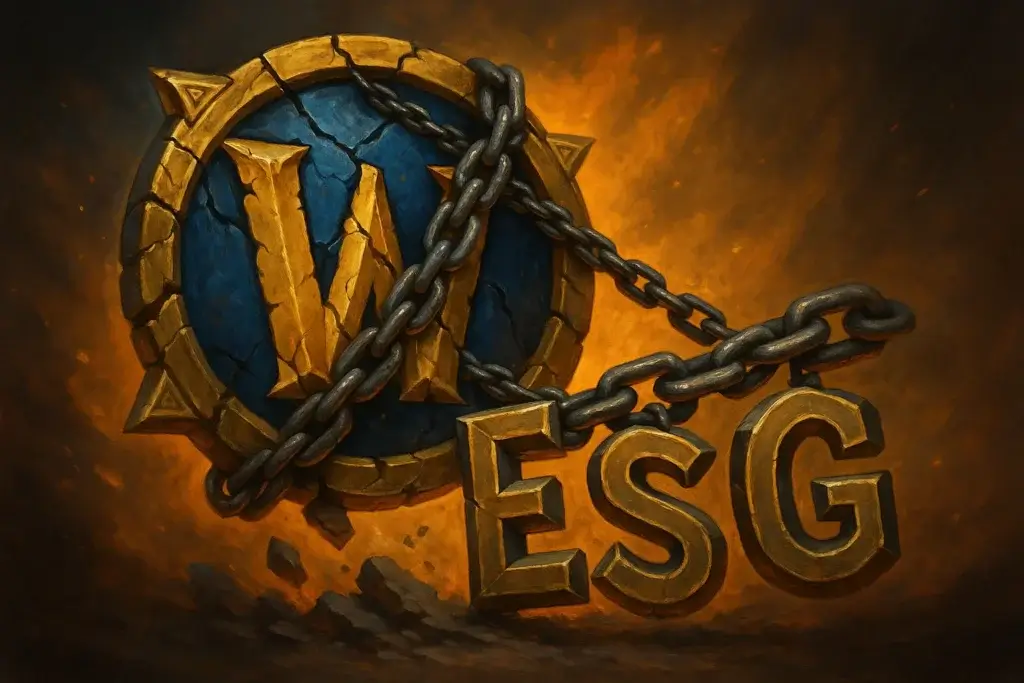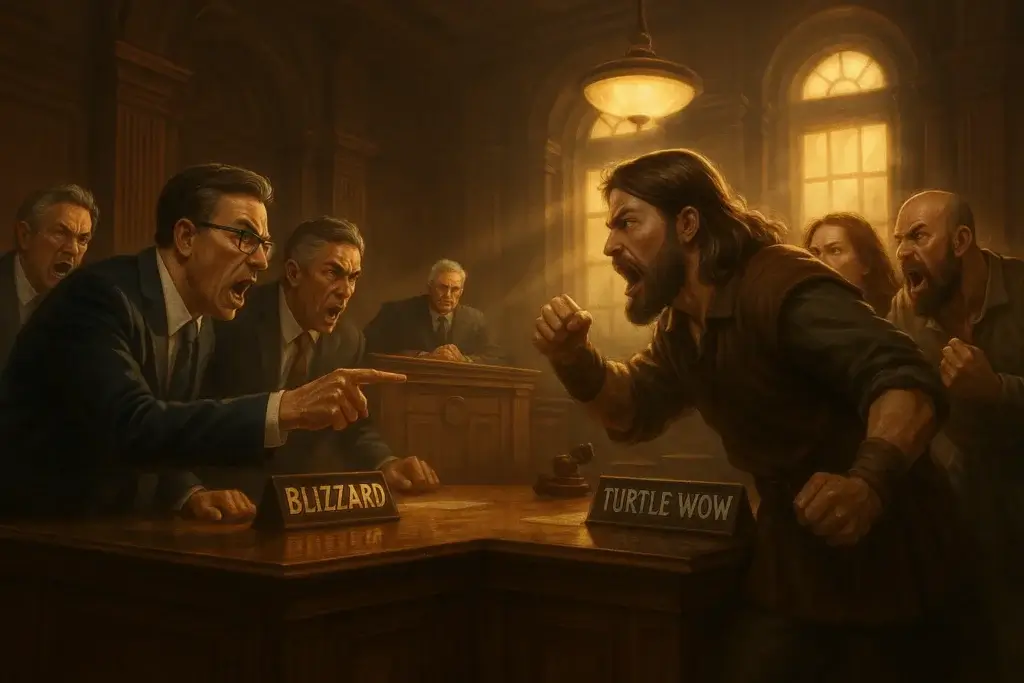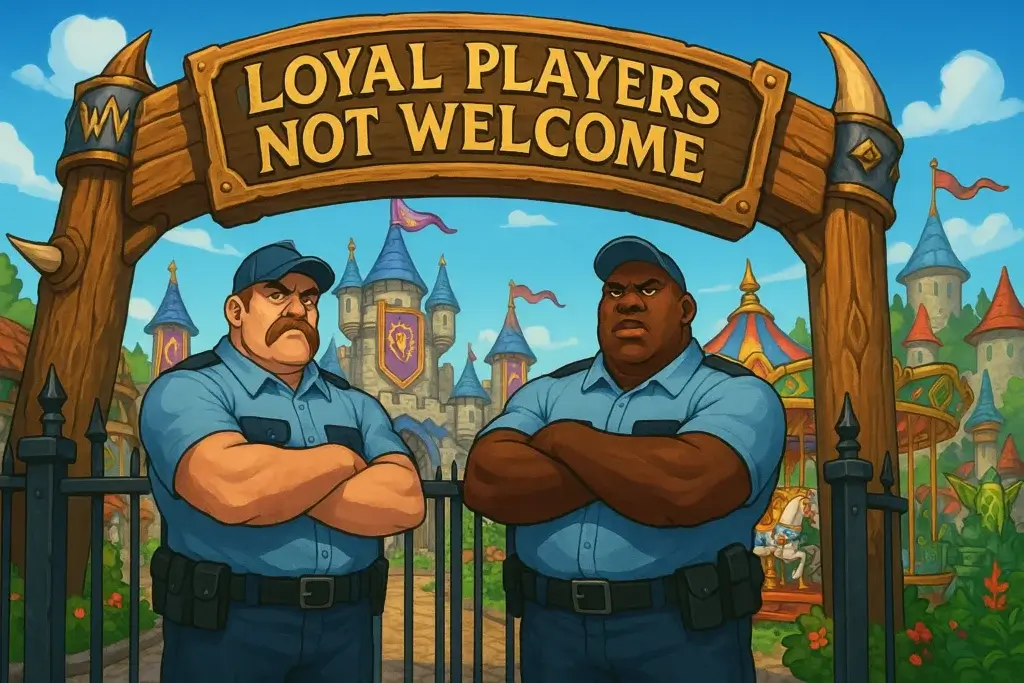There is a single, devastating paradox at the heart of the modern corporate world, and the impending downfall of Turtle WoW exposes it completely: The relentless pursuit of ESG and DEI mandates doesn’t strengthen a company; it systematically sabotages its two most vital assets—control over its intellectual property and the competence of its workforce.
Blizzard Entertainment, a subsidiary of Microsoft, one of the most ESG-committed corporations on earth, has proven this in the most spectacular way possible. They are now forced to use a legal weapon of last resort—the RICO Act, designed for the mafia—to try and reclaim control of their own intellectual property from a group of passionate fans. Let that sink in.
A $70+ billion company cannot compete with the creative output of a merit-based, un-woke development team. So instead of innovating, it litigates. Instead of building, it destroys.
How ESG Makes You Lose Control of Your IP
When your internal development is strangled by diversity quotas, narrative sensitivity reviews, and a priority on signaling virtue over shipping quality, you create a vacuum. Nature abhors a vacuum, and passionate talent abhors creative stagnation.

Superior versions of your own product will inevitably emerge from the outside. Your iconic worlds and characters become cultural touchstones that you, yourself, are no longer capable of stewarding. You become a landlord of a legacy you can no longer maintain, forced to hire lawyers to evict the squatters who are better caretakers than you are.
How ESG Sabotages Your Workforce
ESG and DEI are, at their core, anti-meritocratic. They mandate that identity is a primary qualification. The result? You are not hiring the best engineers, the most visionary artists, or the most gifted storytellers. You are hiring to fill a quota.
You create a bloated bureaucracy of “Compliance” and “Inclusion” managers whose sole purpose is to police language and thought, not to ship product. This creates a two-tier workforce: the ideological enforcers and the demoralized creators.
Turtle WoW’s 100-person volunteer team stands as a brutal indictment of this model. Unburdened by internal ideological warfare, they were able to do what Blizzard could not: focus. Their anti-bot systems worked better. Their new content felt truer to the source material. Their expansions honored the world that players loved instead of rewriting it for HR approval.
Their success proves what happens when you simply let talented people build without a DEI commissar breathing down their neck.
The RICO Lawsuit: Blizzard’s Last Resort
Blizzard’s response to this humiliation? They cannot offer a licensing deal. To do so would be to admit that their corporate framework is broken beyond repair.
Bringing Turtle WoW in-house would mean subjecting it to the same ESG chokehold that made its existence necessary in the first place, ensuring its inevitable mediocrity.

So they skip the deal and go straight for the kill. A RICO lawsuit—meant for organized crime syndicates—is now their weapon of choice against hobbyist fans. That’s not just legal overreach; it’s an admission of creative bankruptcy.
It is the final, desperate tool of a company that has lost control of its culture, its product, and its destiny.
The Final Alienation: Burning the Faithful
In its short-sighted quest to reassert control, Blizzard has likely achieved a Pyrrhic victory with a consequence they have entirely overlooked: the permanent alienation of the disaffected player.
The 500,000 active players on Turtle WoW were not casual tourists. They were refugees. They were the most passionate, invested, and knowledgeable members of the Warcraft community—the very players who cared enough to seek out a better version of the game they loved. They were Blizzard’s most valuable asset: a dedicated fanbase waiting to be won back.
By choosing to invoke RICO—a statute synonymous with taking down drug cartels and crime families—against these players and the developers who served them, Blizzard has sent an unforgivable message:
“You are not valued customers. You are the enemy.”
This is not the same as shutting down Nostalrius. That was a cease-and-desist against a project that, while popular, largely replicated the classic experience. It created outrage, but that outrage could be (and was) channeled into a demand for Official Classic.

This is different. Turtle WoW offered something Blizzard has repeatedly refused to provide: a true Classic Plus. By nuking it from orbit, Blizzard isn’t just removing a competitor; they are explicitly destroying the specific thing their most disenfranchised players desired. They are demonstrating, in the most dramatic way possible, that they do not want to provide that experience, and they will not allow anyone else to provide it either.
The result is irreversible. These players will not “come home” to cfficial WoW Classic servers or a future, sanitized, ESG-compliant “Classic Plus” from Blizzard. They now understand that the company views their vision for the game as a criminal enterprise to be litigated into dust, not a passion to be embraced.
They won’t return. They will scatter to other, quieter private servers. They will leave the Warcraft ecosystem entirely for games that respect their intelligence and their autonomy. Or they will simply quit, taking their passion, their community-building energy, and their disposable income with them.
In trying to kill a competitor, Blizzard hasn’t protected its kingdom; it has salted the earth around it, ensuring nothing can grow—not even its own future. They have chosen to rule over ruins, betraying the very people who built them, forever.
Conclusion: The Death Spiral of ESG
The lesson for any executive, investor, or creator is clear: ESG is not an asset; it is a liability. It is a voluntary surrender of competitive advantage. It neuters innovation, poisons talent management, and hollows out brands until they can only be defended with lawyers, not with better products.
The future belongs to builders who reject this death spiral. It belongs to the studios that will hire for passion and skill, not for identity quotas. It belongs to investors who will fund merit over ideology. It belongs to nations willing to protect innovation from the long arm of the withered, woke West.
Turtle WoW may be dismantled by legal decree, but the truth it revealed cannot be sued into oblivion: the strongest ESG strategy is simply to make a better game. And that is the one thing the modern corporate order is systematically designed to prevent.
—Wolfshead




A slow and cruel end to a cultural phenomenon and world.
In the end they even destroyed or at least got rid of the very creators that created the World of Warcraft.
Ruined by evil. I didn’t like Cataclysm and Pandaria. Surprisingly many praise Pandaria, maybe it had some great things but the background lore got totally stupid at that point.
I hoped WoW would return after Warlords if Draenor and Legion was really great. But it literally ended the main WoW story at and after that it was a lot of hogwash.
I still remember diving for iridescent pearls with my Warlock and swimming along the shoreline into higher level areas.
Similarly disgusting things happened and happen to Lord of the Rings Online atm.
If I would take a shot for every lesbian woman in contemporary science fiction literature I would already be dead. It is very hard to find writers who totally avoid that and I no longer read those pandering too hard to woke sensitivities.
Ruined by evil is right. Mike Morhaime allowed all of this to happen. The Titan team also bears responsibility.
The rise of fall of Blizzard and WoW will be in the history books as one of the biggest self-inflicted wounds in video game history.
P.S. Guess what? Morhaime just announced layoffs at Dreamhaven.
I played WoW for the first time in 2006, it was on a private server, because I was a kid and didn’t have money to buy the game or pay for a subscription. If I asked my parents they would laugh at me off all the way to the adoption office.
I played on Turtle WoW since 2018 when the server launched. It had 50-100 players and had x0.5 XP rates and almost no custom content except 1-2 NPCs. Everything was Vanilla AF.
Only as it grew bigger it changed to x1 XP rate, then added “tents” from the new Survival skill that players can build with reagents and placing it on the ground, as you stand around it, you get Rested XP at super fast speeds. If multiple people spawn multiple tents, it the speed stacks even faster. So you see 30-40 people sitting around tents in Goldshire, outside Stormwind, Razor Hill, Crossroads, etc. all fooling around and getting into shenanigans.
They updated classes and created new skills, abilities, talents, made new talent builds viable, like Arcane Mage or Melee Survival Hunter. They added High Elf for the Alliance and Goblin for the Horde. They added so many new zones and landmass as well as quests. You can level from level 20 until 60 almost entirely in new zones and doing new quests. Everything is lore-friendly and fits the world and story perfectly.
They also expanded existing zones where there would originally be mountains with nothing on them into more content.
When I was playing Vanilla in 2006 I always imagined the future of WoW to be Turtle WoW, I never imagined how garbage the expansions will be since TBC and WoTLK and those were the “less horrible ones”. After seeing how horrifying expansions were, I settled only for Vanilla private servers since 2013 and when Turtle WoW launched custom content exactly what I once envisioned, it was a dream come true, so much so I couldn’t comprehend this was actually happening.
I don’t play as much (of anything these days) as I grew out of it a bit, but I put on Turtle WoW and some other old school games at least 2-3 times a month for about 30-60 minutes,
I wish Turtle WoW the best and I hope they can survive those circumstances and live on. Soon they should release the Unreal Engine 5 client for the game – either in December 2025 or April 2026 and I hope this situation doesn’t impede their efforts, because I want to experience Vanilla Plus in Unreal Engine 5. The creators of Unreal Azeorth, which is what the UE5 Vanilla WoW project is called are separate team, but are affiliated with Turtle WoW and as I follow both Discord servers, the Unreal Azeroth team stated that whatever happens with Turtle WoW, they will continue work on their project and it will be released along with a server.